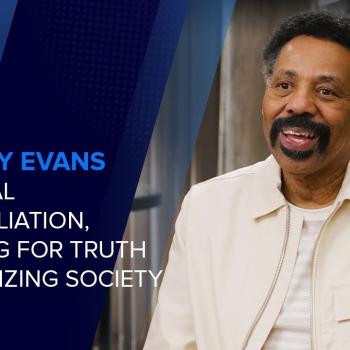What are some of your favorite vacation spots? Which places have you visited that you’ve most enjoyed? Maybe you’ve visited the incredible Swiss Alps, Hawaiian Islands, the African safari, the Bolivian rainforest, the Florida Keys, the Jersey Shore (you guessed it, I’m from Jersey!), or the Bahamas. Or, maybe you’ve simply enjoyed a visit to a local park, a sunrise from your bedroom window, or a beautiful moment with a friend or partner.
We often find beauty in nature. For example, if you read Patheos blog, Where do we find real beauty?, you noticed that Andy McDaniel finds beauty in the ocean’s majesty.
In these moments of beauty, you may experience a sense of awe. You might feel small, surrounded by something infinitely larger than yourself, and have that sense that something inside of you was changing.
Moments of awe
I will never forget driving out West with my parents as a teenager, packed in the backseat with my siblings listening to all the 90s classics on our homemade cassette tape playlists. “I believe in the sand beneath my toes, the beach gives a feeling, an earthly feeling, I believe in the faith that grows…” from Third Eye Blind played over and over again each restless day of driving. But when I looked up on the fourth day of driving past countless corn fields, I saw what I thought for a moment were bright clouds. But when I looked again, those clouds took shape and, though they stretched into the heavens, weren’t clouds at all, but rather snow-capped mountains. We were approaching Grand Teton National Park and with the sight of mountains stretching past the clouds, it was as if everything around me paused and I soaked in this precious beauty—vast and surpassing all I had ever known.
Psychological effects of beauty
It’s likely that as you consider moments of awe, you notice that many of those moments involved an experience of beauty. It’s no surprise that we experience awe in response to beauty, as we are created for beauty. In fact, psychological studies demonstrate that beauty elicits all kinds of positive emotions, such as fascination, awe, relaxation, and admiration (Schindler et al., 2017; Keltner & Haidt, 2003; Goller et al., 2019). Beauty also attracts and elicits wonder and insight (Schindler et al., 2017; Keltner & Haidt, 2003; Goller et al., 2019); and buffers against stress and pain (Martinez-Marti et al., 2016, 2018; Spain et al., 2018).
Beautiful world
Alongside our inherent propensity for beauty, our beloved world is, indeed, beautiful. We read in Genesis that when God looked upon creation, He saw that it was very good (Genesis 1:31). There’s a sense of beauty and wonder there; and what’s more—God created this beautiful world for us—to be known to us, available to us, such that we can wonder and live in awe of this greatness.
Glory is beauty
Additionally, in the Bible, we often read about glory, which may feel a bit abstract. But according to the Cambridge Dictionary, glory also means “great beauty.” Thus, when we read that the Lord’s glory will be known (cite), or that we will come into His glory, we may consider that we are meant to come into His beauty. We are meant to participate in this beyond beautiful cosmos and become united with it.
Threats to beauty
Anyway, let’s get back to the problem. Yes, our world is beautiful and seems to have been created so; yet in recent years, we’ve heard of dying coral reefs, fatal wildfires, and endangered Monarch butterflies. Have you noticed that many environmental threats are also a threat to beauty?
When we don’t take care of our earth, its beauty suffers; and when beauty is at risk, so are we; as we are meant for beauty.
Beautify the world
Appreciate beauty
So let’s aim to appreciate the beauty of the world, searching for it everywhere we go. Let’s relish in it—in the dandelions surviving and thriving in an abandoned city lot—let’s enjoy it and be thankful for it. Appreciate it and uphold it as good. Contemplate it and delve into it—learning more about what underlies all that is beautiful. Importantly, let’s not only work to relieve environmental burdens, but let’s strive towards beautifying our world.
Love is beautiful
Now, what’s most fascinating, at least to me, is that moral actions—love—have been shown to be beautiful (Diessner et al., 2008). You can read more about the appreciation of beauty—including moral actions—in Dr. Rhett Diessner’s book, Understanding the Appreciation of Beauty Trait. You’ll find out more about why beauty “makes life worth living” (Diessner, 2019).
An act of love is an act of beauty
So how can we beautify the world? Well, we all have different gifts, but we can start by sharing those gifts and loving others in the ways that we can. For some of us, that means listening to a friend who’s struggling; or attending a nephew’s baseball game. For others, it’s sharing music or art; fighting for the rights of the imprisoned; helping a neighbor repair his front steps; donating money to the Missionaries of Charity; cleaning up trash from a local brook; reusing and recycling; or welcoming someone in need into your home. The possibilities are endless, but each act of love is an act of beauty, and vice versa. When we love, we beautify the world.
Pray for beauty
Finally, when we pray for something, our minds contemplate it; we become more like it. So let’s pray for beauty—the beauty of the world. In doing so, we’re likely to experience an increase in noticing, appreciating, and contributing to the beauty of the world.
If you can relate to Third Eye Blind’s Semi-Charmed Kind of Life and you “want something else to get [you] through this life,” you may consider beauty, which, in Dr. Diessner’s writings, you’ll see “makes life worth living” (Diessner, 2019).
In our acts of prayer and love, let’s watch as the earth becomes beautiful again—as coral reefs revive, wildfires subside, temperatures decline, and butterflies swarm above frog-filled ponds in rain forests. Let’s feel that “earthly feeling” as we walk with “sand beneath…toes” and see if our faith truly grows. Finally, upon searching for beauty and encountering it, let’s rejoice together in our beautiful world.

















